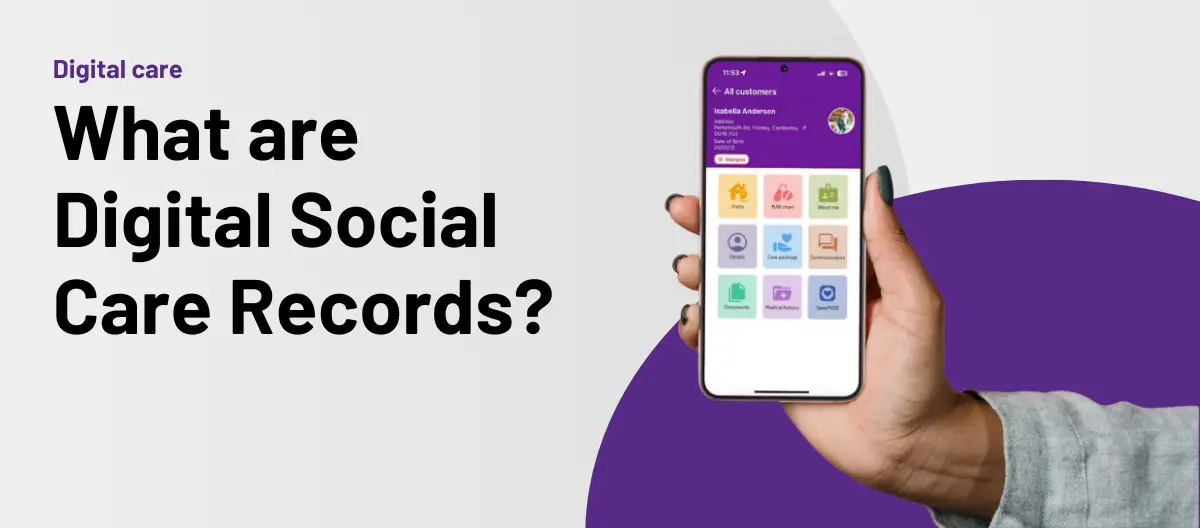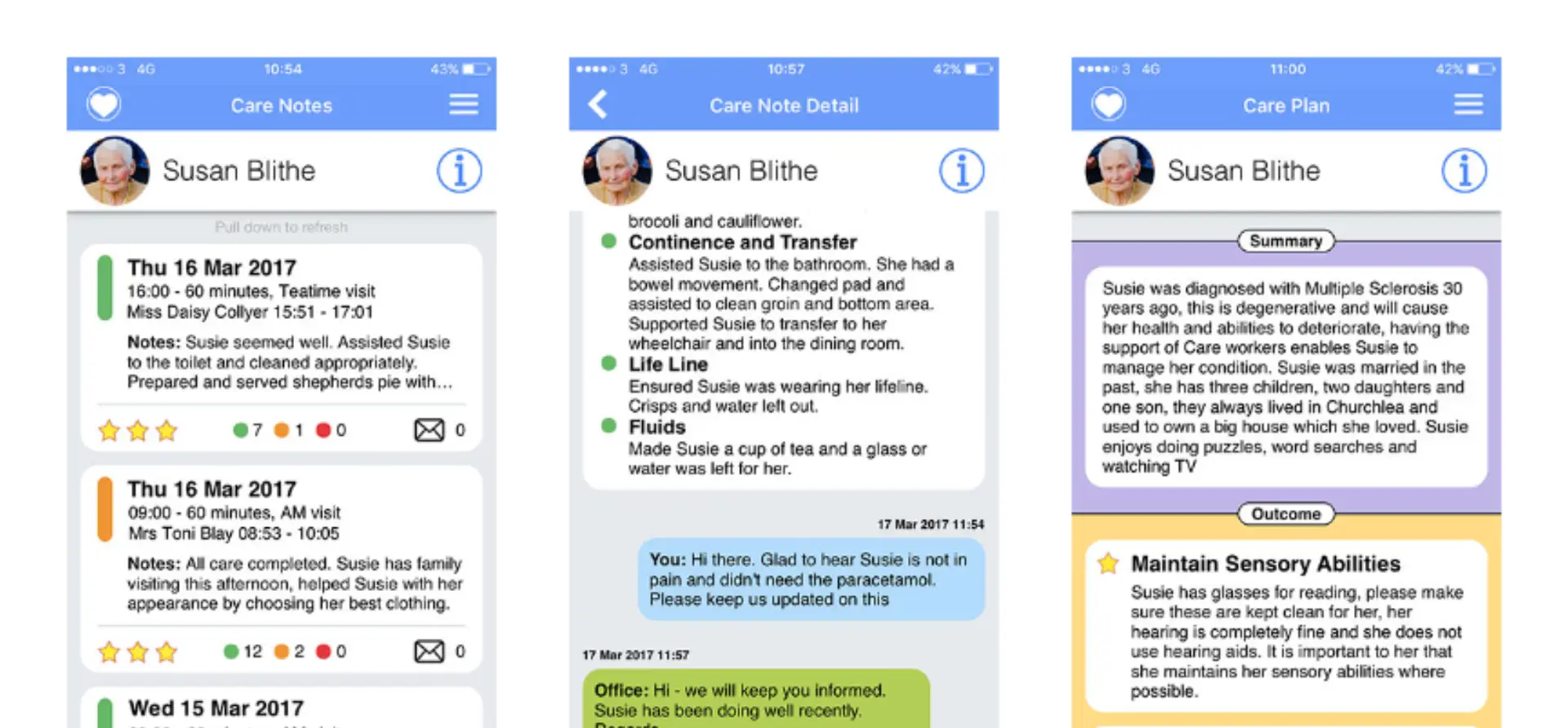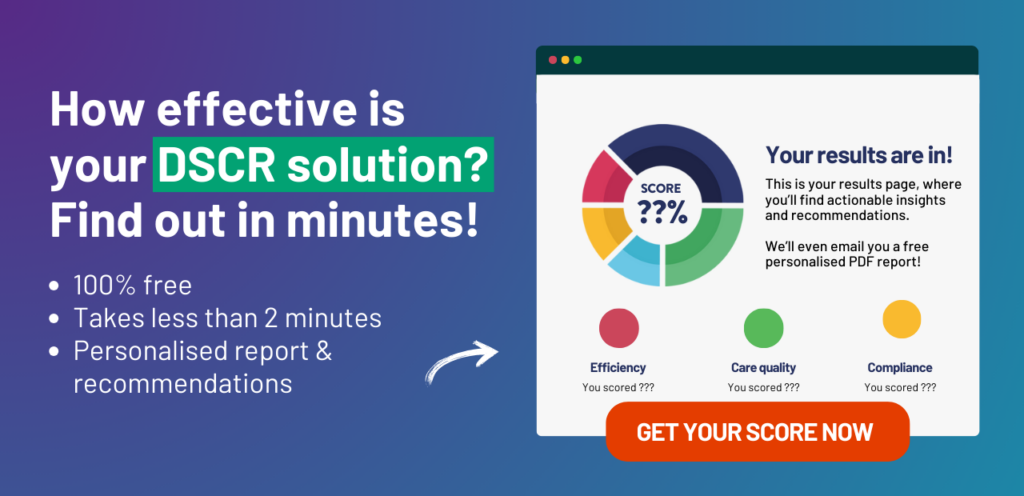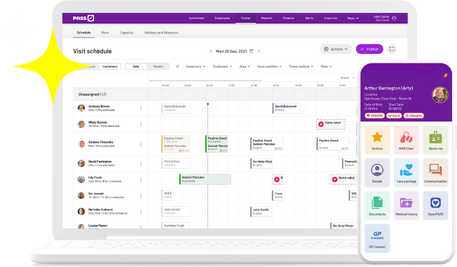Digital Social Care Records (DSCRs) are changing the way we manage care, making it more responsive, more accurate, and more connected than traditional paper-based ways ever could.
In this guide to digital record systems, we’ll look at the benefits of digital care planning, what a good system looks like, and how you can make the transition from paper to electronic health records.
Let’s get started.

Table of Contents
What are Digital Social Care Records and why do we need them?
Digital Social Care Records – also known as DSCRs – are electronic systems used to store, manage, and access data related to social care services.
They replace traditional paper-based records and encompass personal details, medical histories, care plans, medication schedules and records, and daily care activities of individuals receiving care.
Why do I need a Digital Social Care Record system?
The move towards digitisation in social care is not just a trend but a necessary evolution. With an increasing demand for care services and the need for more efficient management systems, Digital Social Care Records have become indispensable.
These systems enable care providers to store, access, and manage information electronically, leading to streamlined operations and improved service delivery.
One of the primary advantages of digital records is the enhancement of efficiency and accuracy in care delivery.
By digitising records, care providers can quickly access and update information, reducing the likelihood of errors and ensuring that care plans are current and reflective of the individual’s needs.
The use of platforms like PASS and solutions such as home care software, supported living software, and care home software facilitates this efficiency.

Digital records also play a crucial role in enhancing the accessibility of information, improving the coordination of care.
Care providers can seamlessly share authorised information, ensuring that everyone involved in an individual’s care is aligned.
This coordination is particularly crucial in complex care scenarios, where platforms like complex care software can make a significant difference.

Key benefits of implementing Digital Social Care Records
The implementation of DSCRs brings numerous benefits. It not only simplifies the documentation process but also ensures that care is more personalised and responsive to the needs of individuals.
Streamlining care management processes
Digital records streamline various aspects of care management, from planning to delivery. Tools like PASS care planning aid in creating detailed, personalised care plans that can be easily updated and monitored.
Additionally, features like rostering and care reporting further enhance the management and delivery of care.

Enabling better decision making
Digital records provide a comprehensive view of an individual’s care history, enabling better decision-making. With complete and up-to-date information at their fingertips, care providers can make informed decisions that are in the best interest of the individual.

Person-centred approach
A person-centred approach is at the heart of effective digital record-keeping. This approach ensures that the individual’s preferences, needs, and goals are central to their care plan, with platforms like OpenPASS providing accessible, transparent information to those receiving care and their families.

Must-have features of top Digital Social Care Record systems
Effective digital records are characterised by certain key features that make them valuable tools in social care. Here’s what sets apart a good DSCR system from a great one:
Ease of use: designing designed for accessibility in digital care records
Digital Social Care Records must be user-friendly, ensuring that they are accessible to all users, including care providers, individuals receiving care, and their families. The design should facilitate ease of use, with clear interfaces and intuitive navigation.

Seamless system integration: the role of interoperability in care coordination
Interoperability is essential for smooth communication between different care systems. However, achieving this can be complex and costly, leading to cumbersome integrations.
That’s where solutions like PASS shine, delivering a comprehensive solution in one simple platform.
This eliminates the need for complicated setups, streamlining care management and letting providers focus on care.
Keeping care current: the importance of real-time data in digital records
Immediate updates and broad accessibility are non-negotiable for effective digital records. These features guarantee that care decisions are based on the latest information, accessible on the move on approved devices.
It’s about keeping the lines of communication open and responsive to the dynamic nature of care needs.
Guarding privacy: data security and GDPR compliance in care management systems
Digital care records must comply with stringent data protection regulations, like GDPR.
This approach to safeguarding personal information not only builds trust but also respects privacy at the highest level, laying the groundwork for a transparent and reliable care environment.
Discover the best care management software for your care setting.
The transition to digital social care records: what to expect
Adopting a digital care management solution is a significant step forward. To ensure you’re making the most of this technology, here are some best practices to implement from the start.
Initial and ongoing training
Effective use of Digital Social Care Records is underpinned by comprehensive training and support for users. DSCR providers offer initial training to familiarise staff with the system, followed by ongoing support to adapt to new features and updates.
This training is tailored to different levels of tech proficiency, ensuring all users are confident and capable in utilising the digital system.
Providing continuous support and resources
Beyond initial training, continuous support is available to address any challenges users may encounter. This includes troubleshooting assistance, resources for further learning, and guidance on best practices in digital record-keeping.
Such support is essential in maximising the benefits and usability of DSCRs for all care providers.

Incorporating feedback from care recipients and staff
Gathering regular feedback from both care recipients and staff is crucial for continuous improvement.
By listening to those who interact with the digital record systems daily, you can refine and adjust the system to better suit their needs. This feedback loop helps in keeping the system user-friendly and effective for all.
Data accuracy and consistency
Maintaining data accuracy is essential in digital record keeping. This means ensuring that all information entered into the system is correct and up to date.
A consistent approach to data entry, such as using standardised formats and regular checks, helps in avoiding errors and maintaining the integrity of the records.
Troubleshooting challenges during the digital transition
The shift from paper to digital records marks a significant leap forward, freeing carers from mountains of paperwork.
Yet, this journey is not without its challenges, especially when ensuring that the digital system is accessible to everyone involved.
In this section, we’ll explore these hurdles and spotlight the solutions that not only facilitate a smoother transition but also demonstrate how strategic approaches, like those we offer, are essential.

Onboarding: managed or go it alone?
The move to Digital Social Care Records brings a host of benefits, alongside a set of challenges that require thoughtful solutions. From technical barriers to concerns about confidentiality, we need to address each issue head-on.
PASS, for instance, streamlines the transition with a fully-managed digital onboarding service, empowering care providers to adopt digital solutions swiftly and confidently.
Training for technological adaptation
Adapting to new technologies is often a significant hurdle for staff accustomed to paper-based systems.
Recognising this, PASS delivers customised training programs catering to various skill levels, ensuring every team member is comfortable and proficient with the digital tools.
This training evolves with the system, keeping staff up-to-date with the latest features and functionalities.
Streamlining data migration
The transition of records from paper to digital format is critical, demanding precision to maintain data integrity and continuity of care.
At PASS, our specialists in data migration assist care providers in securely and efficiently moving their existing records to the digital platform, executing this transition in stages to reduce disruption and ease the learning curve for staff.
Technical support
Addressing technical challenges, such as outdated equipment or limited technical knowledge, is vital for a smooth digital integration.
PASS supports care providers with comprehensive assistance, including troubleshooting, updates, and training on new system features, maximising the benefits of digital records.
Security and compliance
Securing Digital Social Care Records is crucial for protecting sensitive data. Here’s what you need to know about ensuring GDPR compliance and data safety in your DSCR systems:
GDPR compliance and encryption
Digital Social Care Record (DSCR) providers are rigorously committed to upholding data privacy and security, particularly in compliance with laws like the General Data Protection Regulation (GDPR).
This commitment is demonstrated through the use of advanced encryption techniques, a practice proudly adopted by PASS to ensure the utmost security of data.
Encryption serves as the first line of defence, converting sensitive data into a complex code that can only be deciphered with the correct key, thus protecting personal and health information from unauthorised access or breaches.
Access controls and security audits
Alongside encryption, stringent access controls are vital in maintaining data integrity. By ensuring that only authorised personnel have access to sensitive information, DSCR providers uphold the highest standards of confidentiality.
Regular security audits are integral to this process, helping identify and rectify any potential vulnerabilities. These audits ensure ongoing compliance with data protection laws and adapt to evolving cyber threats, reinforcing the trust placed in digital care systems.
These controls include security features such as Biometric login and multi-factor authentication.

Evaluating and improving digital records systems
Evaluating the effectiveness of digital records systems is vital for ensuring they meet the required standards and truly benefit care recipients.
Assessment and inspection of digital systems
The assessment of digital record systems is crucial to ensure they not only meet industry standards but also genuinely enhance the quality of care.
When evaluating these systems, it’s important to consider factors like ease of use, data integrity, and the ability to support comprehensive care planning.
Tools like PASS care reporting are instrumental in providing insights into the effectiveness of care delivery, yet there’s more to consider under regulatory standards.
Expanded role of regulatory bodies
Regulatory bodies like the Care Quality Commission (CQC) play a pivotal role in this landscape. They set and enforce standards, conduct inspections, and provide guidance for Digital Social Care Records (DSCRs).
Their guidelines detail what constitutes a good digital record system, focusing on aspects such as data protection, user accessibility, interoperability, and the system’s contribution to the quality of care.
Setting standards:
CQC sets specific standards for DSCRs, ensuring they are safe, effective, and user-friendly. These standards encompass areas like data security, privacy, and accuracy. Compliance with regulations such as GDPR is also emphasised, ensuring that sensitive personal data is handled responsibly.
Conducting inspections:
CQC inspections assess whether care providers are using digital records in a way that complies with set standards and enhances care quality. Inspections may involve evaluating how data is recorded, stored, and accessed, and ensuring that these processes align with best practices in care delivery and data management.
Providing guidance:
The CQC also offers guidance to care providers on implementing and managing digital record systems effectively. This includes advice on choosing the right system (typically an NHS Assured Solution), training staff, and integrating digital records into daily care practices.
Ensuring interoperability and integration:
Another key aspect is ensuring that DSCRs can integrate effectively with other healthcare systems, a principle strongly advocated by regulatory bodies.
Case studies and real-world examples of Digital Social Care Records
To learn more about the impact and benefits of digital record systems, read through some of our digital social care case studies:
For domiciliary care providers:
Listen in as Registered Care Manager Sue Troelson shares her journey on going digital. Find out the steps she took and the impact Digital Social Care Records have had on Joghide Homecare.
For residential care settings:
Discover how Digital Social Care Records improved care delivery, documentation and data accuracy at the Court Nursing Home.
For local authorities:
Learn how Reading Borough Council and Liverpool City Council have enhanced their quality of care since implementing Digital Social Care Records.
Looking ahead: The future of Digital Social Care Records
Digital Social Care Records (DSCRs) mark a pivotal shift in care management, offering key benefits like improved efficiency, decision-making, and crisis management.
As we look to the future, advancements in artificial intelligence (AI) and machine learning are set to revolutionise DSCRs further.
These technologies promise to automate routine tasks, provide predictive insights into care needs, and enhance personalised care plans based on data-driven analysis.
Embracing these innovations will not only streamline administrative processes but also elevate the quality of care, making it more responsive and tailored to individual needs.
Social care is evolving rapidly, and the future is brighter with Digital Social Care Records. Don’t just keep pace—lead the way in delivering exceptional, efficient, and personalised care.
Ready to take the first step towards this transformation?
Reach out to PASS for an exclusive, free tour of our digital solution. Discover firsthand the impact it can have on your care delivery and management.
Join us in shaping the future of care, today.






